| Srl | Item |
| 1 |
ID:
079483
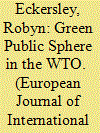

|
|
|
|
|
| Publication |
2007.
|
| Summary/Abstract |
The WTO's decision-making model of executive multilateralism has been widely criticized for its lack of accountability to civil society. However, through the mechanism of the amicus curiae brief, nongovernment organizations and other civil society actors have found a way of directly `inserting' the public interest concerns of civil society into the dispute resolution arm of the WTO, which has proved to be more amenable to `critical public reason' than the trade negotiation arm. This article critically explores both the text and context of the amicus briefs submitted in the transatlantic biotech dispute and highlights their role in generating a green cosmopolitan public sphere that seeks more reflexive modernization and facilitates horizontal forms of regime accountability. Cosmopolitan public spheres are conceptualized as specialized, intermediary structures, with multiple strategic and communicative functions, that mediate between supra-national governance structures and regional and domestic civil societies
|
|
|
|
|
|
|
|
|
|
|
|
|
|
|
|
| 2 |
ID:
079482
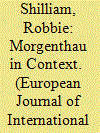

|
|
|
|
|
| Publication |
2007.
|
| Summary/Abstract |
By what criteria might the human condition be considered `tragic'? In this article I argue that historically contextualizing the criteria by which Morgenthau judged the human condition to be tragic requires a sensitivity to what might be called the `international dimension' of knowledge production. Specifically, I argue that Morgenthau's tragic sense of the relation between liberal ethics and the reality of politics was constructed as a reaction to a preceding set of intellectual engagements - exemplified by the political philosophies of Georg Hegel and Max Weber - with the perceived `backward' nature of the `liberal' project in Germany in comparison to that of republican France and capitalist Britain. Through this investigation I argue that inter-societal difference is not simply an object of political theory, but at a deeper level generative in the historical construction of that thought itself. This argument has implications for Morgenthau's recent resurrection as a critical voice on the separation of ethics and politics in International Relations theory
|
|
|
|
|
|
|
|
|
|
|
|
|
|
|
|
| 3 |
ID:
079485
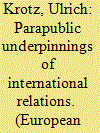

|
|
|
|
|
| Publication |
2007.
|
| Summary/Abstract |
Parapublic underpinnings of international relations are cross-border interactions that belong neither to the public world of states nor to the private world of societies. They underpin relations among specific states and construct social purpose in the international realm. Focusing on Franco-German parapublic underpinnings reveals a particular and neglected kind of `Europeanization'. Such parapublic activity includes massive state-financed youth exchanges, some two thousand municipal partnerships, and a host of institutes and associations. In their entirety, these parapublic interactions have developed into structural components of the European polity. Rather than directly affecting domestic political affairs, this kind of Europeanization connects French and Germans in a certain way. It makes Europeans more European, but without making them less national. This article contributes a concept to properly capture a distinct and substantial type of international activity and to identify its characteristic effects and limitations
|
|
|
|
|
|
|
|
|
|
|
|
|
|
|
|
| 4 |
ID:
079484
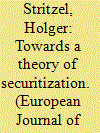

|
|
|
|
|
| Publication |
2007.
|
| Summary/Abstract |
One of the most important and controversial contributions to a vibrant body of new security theories since the 1990s has been the idea of securitization. However, rather than providing a consolidated position the discourse on securitization has only just begun to transform the new idea into a more comprehensive security theory. This article argues that such a theory needs to go beyond the current reflections on securitization by the Copenhagen School. Through internal critique and conceptual reconstruction the article generates an alternative framework for future empirical research and identifies two centres of gravity as a first step towards a more consistent understanding of securitization as a comprehensive theory of security
|
|
|
|
|
|
|
|
|
|
|
|
|
|
|
|
| 5 |
ID:
079486
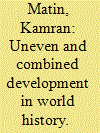

|
|
|
|
|
| Publication |
2007.
|
| Summary/Abstract |
IR's turn towards historical sociology is yet to overcome its ahistoricism. This lack of world-historical perspective, particularly conspicuous in relation to the non-European world, and arguably IR's emergence as a discipline, can be traced back to the theoretically fateful negligence of `the international' by the classical (historical) sociology on which the contemporary critiques of the mainstream IR theory tend to draw. This article develops this argument within the context of a theoretical reappraisal of the traditional approaches to the problematique of the premodern state in Iran and proposes an alternative theoretical framework that is critically drawn on Trotsky's theory of uneven and combined development as an internationally augmented historical materialism. Thus it argues that central to the premodern state-formation in Iran were the nomadic geopolitical pressure upon, and rule over, the agrarian Iranian society which gave rise to a synergetic nomadic-sedentary relationship mediated by, and crystallized in, the military-administrative institution of uymaq. This underlay the continuous formation, disintegration and re-production of successive states characterized by centralized patrimonial arbitrary rule.
|
|
|
|
|
|
|
|
|
|
|
|
|
|
|
|